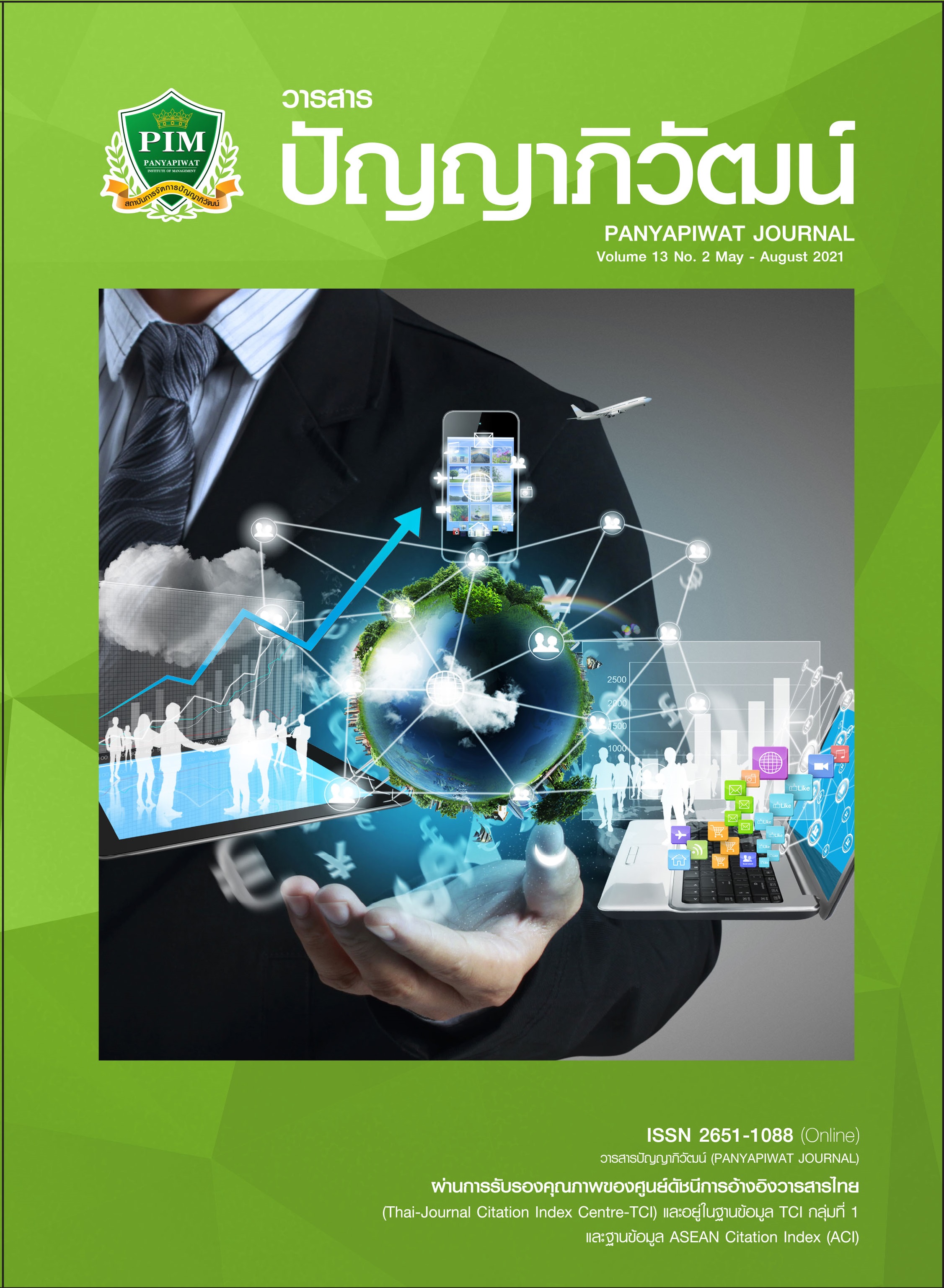การปฏิรูปการศึกษาภาษาอังกฤษระดับมหาวิทยาลัยในประเทศไทย เพื่อให้ก้าวทันการเปลี่ยนแปลงของโลก
Main Article Content
บทคัดย่อ
ผู้ใช้แรงงานทั่วโลกเผชิญกับวิกฤติโรคระบาดโควิด 19 การเปลี่ยนแปลงทางโครงสร้างของประชากรศาสตร์ และการเปลี่ยนแปลงอย่างมหาศาลของเทคโนโลยี ทั้งสามปัจจัยนี้เป็นตัวเร่งให้เกิดการเปลี่ยนแปลงอย่างมหาศาลต่อชีวิตประชาชน ตลาดแรงงานและความต้องการของสถานประกอบการ(United Nations, 2020) เพื่อให้สามารถก้าวทันความเปลี่ยนแปลงของโลก ประเทศไทยจำาเป็นต้องมีการปฏิรูปการศึกษาภาษาอังกฤษในระดับมหาวิทยาลัย โดยเฉพาะอย่างยิ่งการเรียนการสอนภาษาอังกฤษ เพื่อให้ผู้เรียนมีความสามารถทางภาษาอังกฤษ มีความรู้ที่ทันสมัยและมีทักษะการทำางานที่สอดคล้องกับความต้องการ ของตลาดแรงงาน ซึ่งถือเป็นความสามารถในการแข่งขันในโลกยุคปัจจุบัน บทความนี้มีวัตถุประสงค์เพื่ออภิปรายแนวทางปฏิรูปการศึกษาภาษาอังกฤษระดับมหาวิทยาลัยในประเทศไทย ผ่านองค์ประกอบสำาคัญของการศึกษา ซึ่งประกอบด้วย หลักสูตร อาจารย์ผู้สอน การเรียนการสอน การวัดและประเมินผล ผู้เรียน กิจกรรมสำาหรับผู้เรียน คณะกรรมการบริหารมหาวิทยาลัย งานวิจัย และการฝึกปฏิบัติงาน บทความนี้นำาเสนอมุมมองว่า ประเทศไทยจำาเป็นต้องมีการปฏิรูปการศึกษาภาษาอังกฤษในระดับอุดมศึกษาอย่างจริงจัง เพื่อทำาให้ผู้เรียนสามารถมีงานทำาหลังจากจบการศึกษา โดยเฉพาะอย่างยิ่งในช่วงวิกฤตทางเศรษฐกิจ และเพื่อทำาให้อาจารย์และมหาวิทยาลัยสามารถอยู่รอดได้ในโลกที่เต็มไปด้วยการเปลี่ยนแปลงอย่างพลิกผัน
Article Details
“ข้าพเจ้าและผู้เขียนร่วม (ถ้ามี) ขอรับรองว่า บทความที่เสนอมานี้ยังไม่เคยได้รับการตีพิมพ์และไม่ได้อยู่ระหว่างกระบวนการพิจารณาลงตีพิมพ์ในวารสารหรือแหล่งเผยแพร่อื่นใด ข้าพเจ้าและผู้เขียนร่วมยอมรับหลักเกณฑ์การพิจารณาต้นฉบับ ทั้งยินยอมให้กองบรรณาธิการมีสิทธิ์พิจารณาและตรวจแก้ต้นฉบับได้ตามที่เห็นสมควร พร้อมนี้ขอมอบลิขสิทธิ์บทความที่ได้รับการตีพิมพ์ให้แก่สถาบันการจัดการปัญญาภิวัฒน์หากมีการฟ้องร้องเรื่องการละเมิดลิขสิทธิ์เกี่ยวกับภาพ กราฟ ข้อความส่วนใดส่วนหนึ่งและ/หรือข้อคิดเห็นที่ปรากฏในบทความข้าพเจ้าและผู้เขียนร่วมยินยอมรับผิดชอบแต่เพียงฝ่ายเดียว”
เอกสารอ้างอิง
Charoensuthipan, P. (2020, Apr 18). Unemployment Soars to 700,000 as Factories Close. Bangkok Post. Retrieved April 5, 2021, from https://www.bangkokpost.com/business/1902170/unemployment-soars-to-700-000-as-factories-close
EF Education First. (2020). EF EPI EF English Proficiency Index. Retrieved April 19, 2021, from https://www.ef.co.th/epi/
Green, A. (2014). Exploring Language Assessment and Testing: Language in Action. New York: Routledge.
Dai, G. Y. & Liu, Y. (2016). An Empirical Study on Business English Teaching and Development in China—A Needs Analysis Approach. Canadian Center of Science and Education, 6(2), 142-153.
Inkaew, M. (2020). A Simple but Unanswered Question of Why Thai Students Lack Practical English Communicative Skills. Journal of Rattana Bundit University, 15, 1-10.
Jantasin, P. & Pantawee, T. (2020). Problems in Using English Language of Business English Students at Roi Et Rajabhat University: A Student Perspective. Sikkha Journal of Education, 7(2). 1-10.
Keadplang, K., Kamolnate, T., Tiyarattanachai, P., & Srisai, P. (2020). Developing Competencies of Graduates Through Work-Based Education. Journal of Graduate Studies Valaya Alongkron Rajabhat University, 14(3), 1-11.
My Personal History: Dhanin Chearavanont. (n.d.). Nikkei Asian Review, (Special), 27.
Paisanworajit, N. (2014). Deep Approach Learning and Teaching: The Case of Panyapiwat Institute of Management. Panyapiwat Journal, 5(Special), 169-177.
Phacharintanakul, P. (2018). Thailand Today 114 Universities to Drive Thailand 4.0 by Mr. Phornvit Phacharintanakul. Retrieved April 5, 2021, from https://www.youtube.com/watch?v=CNTa8BDy7UE
Phumpho, R. & Nomnian, S. (2019). Challenges for Thai Business People Using English in ASEAN. Kasetsart Journal of Social Sciences, 40(3), 743-750.
Pongsudhirak, T. (2020, Oct 9). Thai Education Reform is Top Priority. Bangkok Post. Retrieved
April 5, 2021, from https://www.bangkokpost.com/opinion/opinion/1998931/thaieducation-reform-is-top-priority
Ratcliffe, S. (2017). Oxford Essential Quotations (5th ed.). Oxford: Oxford University Press.
Renandya, W. A. (2015). L2 Motivation: Whose Responsibility is it? English Language Teaching, 27(4), 177-189.
Ruenroengjai, S. & Preededilok, F. (2017). A Study of the Need for Vocational Manpower Development of Tour Guides in Response to Labour Market Demand. An Online Journal of Education, 12(3), 372-386.
Shepard, L. A. (2000). The Role of Assessment in a Learning Culture. Educational Researcher, 29(7), 4-14.
Sheth, J. (2021). The Industrial Revolution from Industry 1.0 to 5.0! Retrieved April 6, 2021, from
https://supplychaingamechanger.com/the-industrial-revolution-from-industry-10-toindustry-5-0/
Sinha, K. (2008). New Trends and Their Impact on Business and Society. Journal of Creative Communications, 3(3), 305-317.
Stehle, S. M. & Peters-Burton, E. E. (2019). Developing Student 21st Century Skills in Selected Exemplary Inclusive STEM High Schools. International Journal of STEM Education, 6(39), 1-15.
Suwansawat, S. (2020). “New Normal” of Future Educations. Retrieved April 5, 2021, from https://
www.youtube.com/watch?v=DJnZo8sXgtw
United Nations. (2020). Policy Brief: The World of Work and COVID-19. Retrieved May 11, 2021,
from https://www.un.org/sites/un2.un.org/files/sg_policy_brief_covid_world_of_work_and_
COVID-19_june_2020.pdf
World Economic Forum, The Future of Jobs Report (2020). Retrieved April 5, 2021, from https://
www.weforum.org/reports/the-future-of-jobs-report-2020


